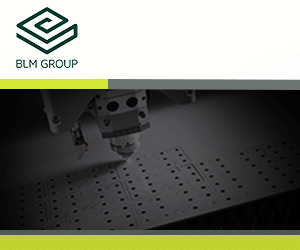Continuing Education… On a CNC? (The Prequel)
Mike Riley reports on how this grassroots response – the heart of the new industrial revolution now taking place in America – recognizes how to use shop floor-oriented continuing education in advanced technologies to offset the profound impact of cheap foreign labor on U.S. manufacturing.
Posted: May 9, 2013
This grassroots response – the heart of the new industrial revolution now taking place in America – recognizes how to use shop floor-oriented continuing education in advanced technologies to offset the profound impact of cheap foreign labor on U.S. manufacturing.
In his CNC Insider column in this issue, Randy Pearson of Siemens Industry, Inc. (Elk Grove Village, IL) discusses how governments in heavy manufacturing states are providing funds to install more machine shops or training classrooms with simulators in those local colleges and vocational tech schools that partner with machine tool builders and CNC suppliers to teach both students and current workers how to program and virtually cut on a CNC machine.
I encourage you to read Randy’s insights about this grassroots response to what I believe are the two most extreme pressures the machine tool industry is fighting to overcome: global market competition and the labor skills shortage. What better way is there to face down these two challenges than to teach advanced machining technology to new minds entering into the industry and, at the same time, further advance the machining skills of those experienced minds that already compete in metalworking?
This grassroots response – the heart of the new industrial revolution now taking place in the U.S. – recognizes how to use shop floor-oriented continuing education in advanced technologies to offset the profound impact of cheap foreign labor on U.S. manufacturing. In fact, the demand for more of this type of continuing education in our schools and workforce was the background that canvassed two recent events I attended – a perfect opener or “prequel” to Randy’s discussion.
The first event was the Automotive Manufacturing Summit at the Manufacturing in America Symposium that was held in Detroit in March. Raj Batra, the president of industry automation for Siemens Industry, opened the Summit by constructing a concise profile of the new industrial revolution around these issues:
• Offshore manufacturing of commodities is not going away.
• High-value products can only be built where innovation takes place.
• Energy costs will not always be higher in the U.S. because shale gas will cause liquid natural gas prices to drop 50 percent to 70 percent cheaper. This competitive cost advantage will restore some re-shoring of commodities.
• Manufacturing is no longer about brawn over brains. It has largely evolved into knowledge work as products and production processes become intensely complex.
Knowledge work launched the call for more shop floor-oriented continuing education when Mike Bastian, the controls manager for powertrain manufacturing at Ford Motor Co., stated that “the line of demarcation between IT and controls in the production facility is getting grayer.” He asked, “Who do you call when you have an issue with the Ethernet network on the plant floor? Engineering, Maintenance, or IT?”
Bastian defined his biggest limitation as human resources for the “cautious, but fast, adoption” of cutting edge technologies, automation, robotics and networks being implemented on the plant floors at Ford. He cannot find enough engineers to fill the jobs that are available because the skill sets in demand are shifting from mechanical to electrical engineering – electro-mechanical engineers. Instead of sitting idle, he began his own shop floor-style continuing education through “efforts being made to train electricians to take on this role.”
“I second everything Mike said,” added Raymond Caillé, the global process manager machine controls for General Motors Powertrain, who echoed the same call for continuing education to address the skills needs of his Tier Two partners in the supply chain.
Kirk Goins, the chief operating officer of Comau Body Welding Business Unit (Southfield, MI), put the need for continuing education in perspective when he explained that roughly 10,000 baby boomers are retiring every day, a labor shrinkage that, when combined with the estimated 600,000 manufacturing jobs left unfilled last year, will “create an estimated 10 million jobs open in manufacturing in 15 years . . . and this does not include the creation of more jobs by the re-shoring initiative.”
Attendees left the Detroit Summit with two equally important impressions. First, the new industrial revolution has enabled the U.S. to compete as a low-cost manufacturer through increasingly complex technology applications on the shop floor. American manufacturers, largely pushed out of the commodity markets, have adapted by competing with higher value products using less significant labor and, in doing so, transformed manufacturing into knowledge work, much of which requires highly skilled labor and post-secondary education.
Second, the new industrial revolution has pushed U.S. manufacturing to the edge of its version of the fiscal cliff: the skilled labor shortage conundrum. Competition in this new revolution demands more advanced technology to reduce costs on the shop floor. This, in turn, demands higher skill levels on the shop floor that cannot be met by the current workforce.
That brings us to the second event, the Northeast Technology Expo hosted by Hyundia WIA America Corporation in early April in Carlstadt, NJ, where Hyundai WIA president IC Lee announced their intent to donate two CNC machine tools worth $250,000 for use in a training program run by G.W. Lisk Company, Inc. (Clifton Springs, NY) and nearby Finger Lakes Community College (FLCC; Canandaigua, NY).
The machine tool builder, along with its dealer Excel Machine Technologies Inc. (Rochester, NY), donated a CNC turning center and vertical machining center to G.W. Lisk to support their program, which addresses the shortage of skilled machinists in the Northeast region.
“The shortage of skilled machinists hurts not only manufacturers, but companies that supply high-tech machine tools as well,” noted Mr. Lee. “Manufacturers are hesitant to buy equipment if they can’t be sure they will have employees to operate it.”
“The National Association of Manufacturers (NAM; Washington, DC) finds the lack of skilled workers to be a problem at companies nationwide,” remarked FLCC president Barbara Risser in her comments at a recent graduation ceremony in Clifton Springs. “Eighty percent of manufacturers say their top concern is finding qualified workers. It’s not trade policy. It’s not taxes. It’s not regulations. It’s finding qualified workers,” said Risser. The fiscal cliff facing manufacturing.
She then explained how part of the problem is the evolution of manufacturing itself. “We are not talking about manufacturing as it was years ago. Today, manufacturing is not about large numbers of people arranged along assembly lines,” stated Risser. “Now we call it advanced manufacturing because it involves using cutting-edge technology and innovative ideas to constantly improve both the manufacturing process and the products themselves.” The new industrial revolution.
To illustrate this point during his own remarks, G.W. Lisk president Mark Kowalski held up an anti-ice valve used on a jet to show its complexity. His company manufactures precision valves, flame arrestors and solenoids for military, aerospace, medical and other industries. “The skills our graduates use today are quite different from what they were five years ago, ten years ago,” explained Kowalski. He thanked Hyundai WIA and Excel Machine for their donation to help keep the students’ skills current with up-to-date machine tools.
G.W. Lisk has been in business for over 60 years and now employs more than 500 people, including 80 design and manufacturing engineers, but their workforce has had difficulty keeping up with an explosive growth in business, expansion of facilities and increasing customer demands. To address this skills shortage, the G.W. Lisk-FLCC program opened in September 2011 with the college providing administration, enrollment and academic classes and G.W. Lisk providing a hands-on trainer and equipment at its Clifton Springs facility.
The first class graduated in March 2012, all with jobs at G.W. Lisk or other local manufacturers, such as ITT Goulds Pumps in Seneca Falls and Halstead Machine in Newark.
“We started with 100 applicants who were interviewed for the program,” explained Dave Phillips, who now has become the full-time training manager of this apprentice model at G.W. Lisk. “Our screening process narrowed the class down to 56 candidates. They become students who attend full-day classes, one-third in class lecture and two-thirds in hands-on training on the shop floor. Six months later, 15 graduates were prepared for full-time employment in a machine shop with the skills needed to work independently.”
G.W. Lisk has received some minor outside funding, but most of its contribution is internal. “We’ve invested about $100,000 in this program,” noted Scott Cumming, the manufacturing manager. “We also purchased an old elementary school next to our campus and converted it into a machine shop lab designed for specific training in the setup and operation of CNC lathes and mills. Our curriculum prepares students for immediate employment as entry level machinists that can interpret engineering drawings and safely operate lathes, mills, grinders, drill presses and precision measuring equipment.”
Diana Austin of Newark, one of this year’s graduates, was hired by G.W. Lisk. She had previously worked in manufacturing but had been laid off in 2011 when her employer closed. “I am back to work now after being unemployed for almost a year and a half. It’s given me a reason to get up in the morning and go to work again, to have a good job with a local company not too far from home,” she said. That’s how to use shop floor-oriented continuing education in advanced technologies.















